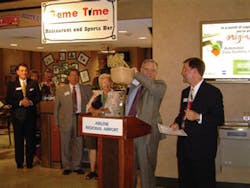BUFFALO GROVE, IL — For airports, GameTime has an unusual name. But then, it had an unusual beginning for a firm targeting airports as its next growth market. It started out servicing minor league baseball parks, thus the name. Today, it sees airports of 500,000 or more enplanements as a prime food and retail target.
The company is officially GameTime Food & Beverage Services, Inc. (www.gametimefbs.com), based here some 20 miles northwest of Chicago. Its primary markets, however, are in South Texas, the Carolinas, and California. The markets currently are centered around the minor league baseball influence, according to business development manager Steven Blumenthal. He and partner Brian Klassman are creating a model by which they cross-train and cross-employ personnel at various venues in a city.
That said, they also see potential for smaller commercial, or regional, airports at which they can make a profit and offer a more diversified menu than typical small restaurants found at smaller commercial airports, they say.
At the same time, GameTime offers a culinary staff to help customize local menus while also offering a turnkey contract management service that can include design of food service areas, handling requests for proposals for equipment and related services, and in turn implementing the actual service.
Minor League Beginnings
According to Blumenthal, the company got its start in 1997 by providing concessions services. Klassman had operated seven Asian restaurants in the Chicago area and had a father-in-law who owned minor league teams and stadiums. Klassman sold his restaurants and in 1999 partnered with Blumenthal to expand the concessions and catering business from minor league stadiums to convention centers, events, other sports venues, and eventually airports.
Explains Blumenthal, “What we decided to do was to go after minor league sports and secondary markets, whatever that encompasses. We started growing the company with minor league clubs, to the point that today we have eight minor league parks.
“Then we started branching out to convention centers. It made sense to have people cross-trained. That eventually led to the McAllen airport, our first airport. “A lot of our current business has to do with Texas because that’s where we’re flooding the area with talent, cross-training them to work in various types of venues.” In all, Blumenthal says the company employs some 1,500 part-time employees; some 25 are in management, including six full-time chefs with international exposure and the capability to design facilities and work with local venues to tailor an airport’s menu for general and local tastes. GameTime recently took over the food and beverage services for airports in Corpus Christi and Abilene, where it also operates the gift and news retail.
“At Corpus, they had a Chili’s which had an abbreviated menu. Management wasn’t happy with it. We’ve expanded the menu.
“We start with local tastes. We have culinary chefs in our company who work with local cuisine. They’re international chefs; it doesn’t matter if it’s Russian or Mexican food. They’ll figure out the local flair — go to the delis, the meat markets, the restaurants in the area.
Target: Airports
Game-Time’s approach to the airport market, says Blumenthal, is to target those markets that the major concessions contractors find to be too small. He says that his company’s experience in more modest markets, and its ability to cross-sell its services via catering and sports venues and to cross-train personnel, makes it a viable enterprise for many communities.
The recent contract in Abilene, he says, is an experiment in finding the benchmark toward profitability in the airport market. Abilene’s airport is less than 500,000 enplanements, but as in Corpus the airport sponsor provided most of the necessary startup design and equipment.
Explains Blumenthal, “Our goal in Abilene is that we’re getting catering for the convention center and the city. We did a big grand opening in August and invited everybody to let them know that we can do catering. We have enough equipment there to actually cater out of the airport. If we can get some catering working in Abilene, it can work out. Otherwise, that could be the benchmark where it’s too small.”
GameTime seeks an initial contract of a minimum of five years, according to Blumenthal. It will consider shorter term, depending on the market. At Corpus Christi, it has a ten-year contract.
Length of term, says Blumenthal, is directly related to upfront investment. If GameTime needs to make a significant start-up investment, it would like to have a minimum of ten years on the agreement.
“It’s really more about traffic,” says Blumenthal. “If we know we’re going to be about 500,000 enplanements or more, we feel pretty good about it.”





